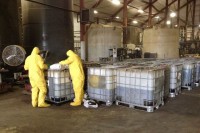Every month in 2020 Columbia Riverkeeper will feature a harrowing David-versus-Goliath story of people coming together to fight for what they love. This month, we turn back the clock to 2015: the fossil fuel industry targeted the Columbia to build a massive oil refinery.
January Throwback Victory: A Community Unites to Stop an Oil Refinery
Columbia Riverkeeper turns 20 in 2020! Congresswoman Elizabeth Furse announced the formation of Columbia Riverkeeper on Earth Day, 2000. But currents run deeper than 2000. Columbia River United, led by Greg and Cyndy DeBruler, formed in 1989 in the Gorge, and Congresswoman Furse started Clean Water Columbia in Portland in 1997. The two groups merged to create one voice to protect the mighty river: Columbia Riverkeeper.

In September 2015 Waterside Energy proposed the first West Coast oil refinery in 25 years—and the first ever on the Columbia River. Oil trains would have delivered crude to the refinery in Longview, WA. Waterside Energy announced the project to great fanfare, after negotiating quietly with the Port of Longview for nearly two years. Riverkeeper partnered with the Lower Columbia Stewardship Council to launch a rapid-response campaign.
First, Columbia Riverkeeper provided the Port of Longview information about the proposed terminal. Riverkeeper discovered Waterside's backers were engaged in a failed biofuels business, so we submitted numerous public records requests and spoke to key people involved. We found out Waterside’s principals had abruptly fired their workers, failed to pay debts, and left behind a Superfund cleanup site at their old facility. We met with port commissioners and presented this information.
“This was a great example of Riverkeeper combining diligent legal research and community organizing to fight dirty, dangerous fossil fuel projects,” said Miles Johnson, Riverkeeper’s Senior Attorney.
Second, Riverkeeper partnered with local residents to pressure the port to reject the oil refinery. We organized regular attendance and comments at port meetings, including comments on Waterside’s finances and business reputation. We highlighted the health impacts of oil refineries and the financial risk to the port. Local residents submitted regular OpEds and letters to the editor.
On February 23, 2016, the port’s commissioners voted unanimously to end negotiations with Waterside Energy.
Community members like Krista Mead, a local elementary school teacher, praised the port’s decision. “I’ve taught in schools near oil refineries—the smell was hard to live with but the rate of childhood cancer was devastating . . . . [T]he port commission did the right thing for Longview’s children.”
The formidable oil industry met its match in the people of Longview, WA. Well done, team.


